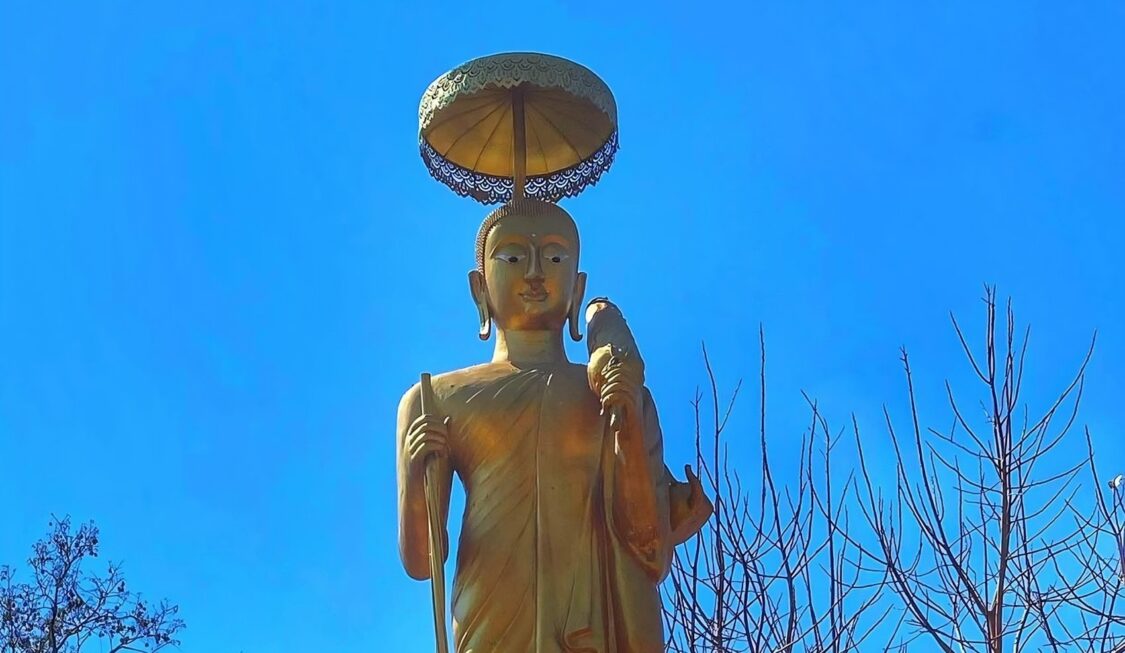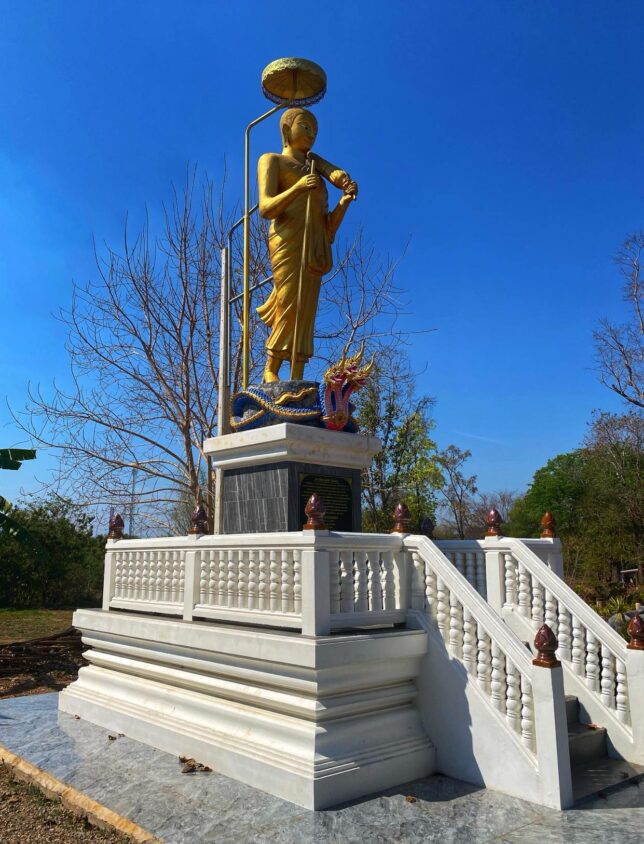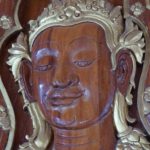Phra Sivali in Thailand: Protector of Travelers

Seen Above: A statue of Phra Sivali at Wat Siri Rat Watthana, Sakon Nakhon
Phra Sivali (พระสิวลี) is a beloved figure in Theravada Buddhism, especially in Thailand. He’s an arhat (a fully enlightened being) and holds a special place in the hearts of many Thai Buddhists. He is in some respects like the Buddhist version of Saint Christopher (the “patron saint of travel”), but he is also more than that. A bringer of good fortune, Phra Sivali’s story weaves together faith, history, and hope.
Phra Sivali’s tale begins with an extraordinary birth. He was born to Queen Suppavasa, a noblewoman married to King Koliya. Legend says he stayed in his mother’s womb for seven years and seven days — a long and unusual pregnancy blamed on past karma. When he was finally born, it wasn’t easy. His mother endured a week of labor. But the moment he arrived, something amazing happened: baby Sivali spoke right away, a sign of his special nature. Soon after, he joined the Buddhist monastic community under the guidance of Sariputta, one of the Buddha’s top disciples, and became an arhat.
What makes Phra Sivali stand out is his knack for abundance. Wherever he went, food, supplies, and blessings seemed to follow. Whether he was in a remote village or a barren wilderness, people offered him alms generously. The Buddha himself praised him as the “foremost in receiving gains,” a title that stuck. Thai Buddhists believe this gift came from good deeds in his past lives, like when he made a huge offering to a previous Buddha, vowing to bring prosperity in the future.
Phra Sivali is often shown standing tall, holding a walking staff, an alms bowl, and prayer beads — symbols of his simple, wandering monk life. These items also hint at his role as a protector of travelers and a source of plenty.
Why Thailand Loves Phra Sivali
In Thailand, Phra Sivali is more than just a historical figure — he’s a living symbol of luck, wealth, and safety. People turn to him when they want their businesses to thrive, their travels to go smoothly, or their homes to be free of trouble. His reputation as a “fortune-fetching monk” has made him a favorite among everyday folks, merchants, and even monks.
One big reason for his popularity is the idea that honoring him brings tangible blessings. Thai Buddhists say that when Phra Sivali was around, no one went hungry — his presence drew generosity from humans and even divine beings like devas (heavenly spirits). Today, people believe that keeping his image or wearing his amulets can attract that same kind of good fortune. It’s not just about money; it’s about having enough of everything — food, peace, and protection.
His connection to travel also resonates in Thailand, a country where many people journey for work, trade, or pilgrimage. Carrying a Phra Sivali amulet is like having a spiritual travel buddy, guarding against accidents or misfortune on the road.

How Thais Worship Phra Sivali
Worshiping Phra Sivali in Thailand is simple and heartfelt, blending Buddhist practice with local traditions. Here’s how people usually honor him:
- Offerings: Devotees offer alms like food, flowers, or incense at temples or home altars where his statues sit. Since he’s tied to abundance, rice or sweets are popular choices — symbols of plenty.
- Amulets and Statues: Phra Sivali amulets are a huge part of Thai culture. Made from metal, clay, or sacred powders, they’re blessed by monks and worn or carried for luck and protection. Small statues of him might also sit next to a Buddha image at home, a nod to his place in the Buddhist story.
- Chanting and Reflection: There are special chants, or katas, for Phra Sivali, often recited to invite his blessings. Some people meditate on his virtues — like generosity and perseverance — hoping to bring those qualities into their own lives.
- Generosity: Since Phra Sivali’s blessings are linked to his past good deeds, many Thais believe that being kind and giving to others opens the door to his favor. It’s a reminder that his worship isn’t just about asking for things — it’s about living better too.
Phra Sivali Chant for Good Fortune
If you wish to call upon Phra Sivali to assist you in obtaining good fortune, recite the Namo Tassa three times, followed by this chant (kata):
สิวะ ลีมะหา เถรัง วันทามิยัง
sì-wá sĕe-má-hăa tăy-rang wan taa mí yang
มะหาสิวะลี เถโร มะหาลาโภ โชติ
má-hăa-sì-wá-lee tăy-roh má-hăa-laa-poh choh dtì
มะหาสิวะลี เถโร ลาภัง เม เม ณะ
má-hăa-sì-wá-lee tăy-roh laa-pang may may ná
คาถาบูชาพระสิวลี
kaa-tăa boo-chaa prá sì-wá-lee
นะ ชาลีติ ฉิมพาลี จะ มหาเถโร สุวรรณะ มามา โภชนะ มามา วัตถุวัตถา มามา พลาพลัง มามา
ná chaa lee dtì chĭm paa lee jà má-hăa tăy-roh sù wan-ná maa-maa poh-chá-ná maa-maa wát-tù wát tăa maa-maa plaa pá-lang maa-maa
โภคะ มามา มหาลาโภ มามา สัพเพชะนา พหุชะนา ภะวันตุเม
poh ká maa-maa má-hăa laa poh maa-maa sàp-pay-chá-naa pá-hù-chá-naa pá wan dtù may
- Speak Thai Naturally Without the Gymnastics - April 20, 2025
- The Best Learn Thai Podcast and YouTube Channel - April 10, 2025
- Phra Sivali in Thailand: Protector of Travelers - March 2, 2025




